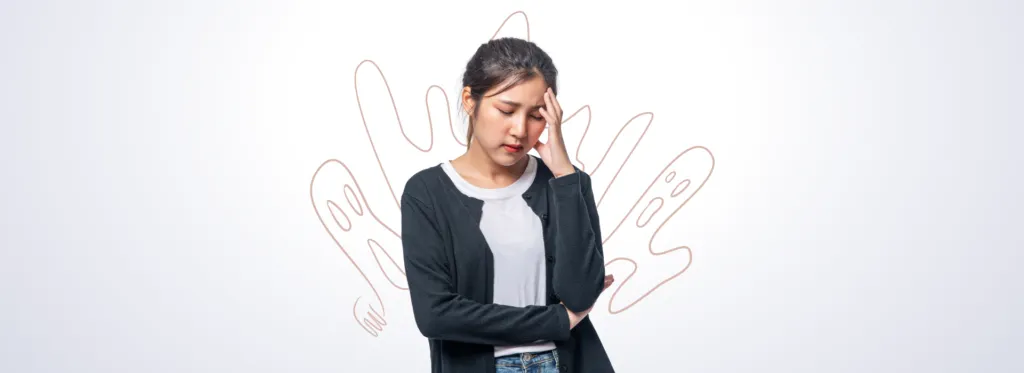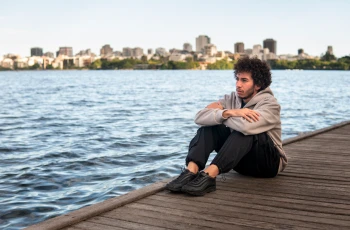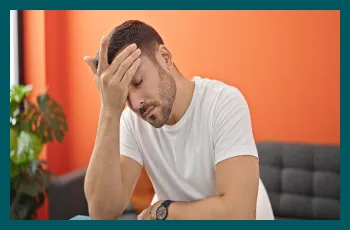Physical Symptoms Of Anxiety - What Is It and How To Manage?
Written by Priyanka Agarwal, Writer at Hola Health Medically Reviewed by Amira Shah, MA in Counselling Psychology, Registered Psychotherapist

Contents

In the medley of human emotions, anxiety plays a contrary role that vibrates not only the mind but also the body. According to the Australian Institute of Health and Welfare1, 3.4 million people or 17% of Australians suffer from anxiety disorders. Imagine feeling the rapid palpitations of your heart, your palms get sweaty, or your muscles tense up. These are just some of the physical symptoms of anxiety. But worry not, for amidst this chaos there are measures and techniques to find harmony and peace, calming both mind and body alike.
What Are The Physical Symptoms Of Anxiety?
Although anxiety primarily manifests as a mental health condition, it can also manifest physically affecting various systems in the body. The symptoms of anxiety can differ from person to person, but the most common symptoms are listed below.
- Excessive sweating, particularly in the palms and face
- Nausea
- Dry mouth
- Muscle tension
- Trembling or shaking, especially in the hands and legs
- Dizziness or lightheadedness
- Shortness of breath
- Stomach ache
- Panic attacks
- Hot and cold flushes
- Headache
- Insomnia or other sleep problems
- Fatigue
- An increased heart rate
- Feeling sick
- Pins and needles
- Restlessness or on the edge
- Gastrointestinal symptoms such as indigestion or diarrhea
- Loss of appetite
- Numbness
- Irritability
- Urge to frequently urinate
Managing Physical Symptoms Of Anxiety
Modifying one’s lifestyle, developing coping mechanisms, and seeking professional help are all necessary for managing the physical manifestations of anxiety. The following measures can help reduce the physiological symptoms of anxiety:
- Regular Exercise: Take part in regular physical activities like swimming, yoga, running, or walking. Exercise releases endorphins, which are the body’s natural stress relievers. Endorphins help lower tension and encourage relaxation.
- Relaxation Methods: Engage in gradual muscular relaxation, mindfulness, or meditation as well as deep breathing exercises. These methods may decrease the physical signs of anxiety and help in soothing the body’s stress reaction.
- Identity and reduce everyday stressors: Acknowledge and cut back on the everyday sources of stress. Setting limits, establishing priorities, and developing the ability to say “no” when required may all be part of this. If needed, take a day off from work or school. Request an online medical certificate with ease.
- Keep up with your bonds: Preserving your social ties with family, and friends can reduce feelings of loneliness. Confiding in trusted people can also serve as a source of emotional support.
- Maintain a healthy lifestyle: Eat a well-balanced diet, get enough sleep, and limit your intake of alcohol, caffeine, and nicotine as these can make anxiety worse.
- Seek Professional Assistance: You might want to think about getting assistance from a counsellor or therapist who focuses on anxiety treatment. Various therapeutic techniques, such as cognitive-behavioral therapy (CBT), can provide you with useful coping strategies to control your anxiety symptoms. Opt for the Mental Health Treatment Plan to get support from professionals.
- Sufficient Sleep: Make sure you receive enough sleep every night because insufficient sleep could aggravate anxiety symptoms. It is advisable to follow a regular sleep pattern and maintain proper sleep.
- Remain Hydrated: Stay hydrated by drinking lots of water throughout the day as dehydration increases symptoms like weariness and dizziness, which are frequently linked to anxiety.
- Be mindful: Try mindfulness exercises or meditation to help you relax and feel less anxious. This can include doing guided meditation techniques, paying attention to your breath, or merely observing your thoughts without any passing judgment.
When To Consult a Doctor?
It is important to seek a online doctor’s advice for physical symptoms of anxiety when they significantly impact everyday life or worsen despite attempts to manage them. If you observe symptoms such as persistent muscle tension, racing heartbeat, difficulty breathing, or excessive sweating, it’s essential to seek medical help. Additionally, if you have health-related concerns or worry that your symptoms may be symptomatic of an underlying health issue, consulting a doctor can provide support and guidance. A healthcare professional can assess your symptoms, provide a proper diagnosis, and suggest appropriate treatment options. Do not delay reaching out for support and assistance to effectively manage your symptoms.
Book an telehealth appointmentwith an online doctor within 15 minutes from the comfort of your home.
While anxiety is a psychological condition, the physical symptoms of anxiety can be disturbing and distressing. By recognising these signs and implementing helpful management strategies, individuals can decrease their impact on day-to-day life and enhance their overall quality of life. It is crucial to remember that seeking support from healthcare professionals and creating a resource kit of coping mechanisms is key to effectively managing anxiety.
Feeling sick and unsure why? Talk to a doctor online, available 24/7
Consult now
Available 24/7, across Australia.
Feeling sick and unsure why? Talk to a doctor online, available 24/7
Consult now
Available 24/7, across Australia.
Reference
- Prevalence and Impact of Mental Illness – Reference Link
Providing consult for
- Cough
- Nausea & vomiting
- Fever
- Hayfever
- Fatigue
- Sore throat
- Acne
- Gout
- Eczema
- Rosacea
- Sunburn
- UTI
- Erectile dysfunction
- Contraception
- Morning sickness
- Morning after pill
- Prostate health
- Anxiety
- Depression
- Stress
- Grief & loss
- Premature ejaculation
- Asthma
- Blood pressure
- Diabetes
- Cholesterol
- Migraines & headaches
- Allergies
- Heartburn & reflux
- Sleep disorder
- Gastro
Related Articles
What Is Online Therapy? Everything You Need To Know About e-Therapy
February 19, 2026Mental Health
...
Disclaimer
This blog is for general informational purposes only and does not indicate that Hola Health provides all treatments or preventive measures mentioned. It is not intended to be a substitute for professional medical advice. Always seek the guidance of your doctor or other qualified health professional with any questions you may have regarding your health or a medical condition. For emergencies please immediately contact 000. Any medical topics discussed are intended to educate, not to imply availability through Hola Health.




